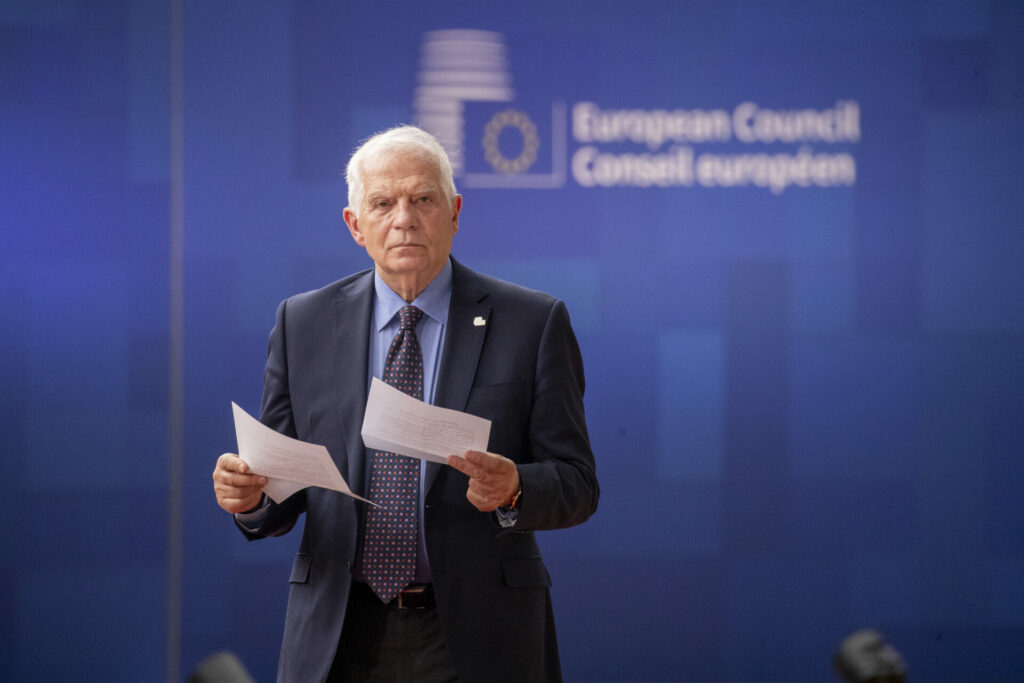Head of the European Union's diplomacy Josep Borrell stressed that the EU's foreign policy is set by the European Council and the Council of Foreign Ministers, this weekend, following criticism over the EU's mixed messaging over Gaza and the visit of the Presidents of the European Commission, Ursula von der Leyen, and the European Parliament, Roberta Metsola, to Israel on Friday.
"The Common Foreign and Security Policy is an intergovernmental policy, not a Community policy," added the High Representative at a press conference on Saturday, at the end of a three-day mission to China.
This clarification came just hours before the President of the European Council, Charles Michel, was due to convene an extraordinary summit of EU heads of state and government, scheduled for Tuesday by videoconference.
"It is of the utmost importance that the European Council, in accordance with the Treaties and our values, defines our common position and establishes a clear and unified line of conduct that reflects the complexity of the current situation," Michel clarified.
Mixed messaging
Several MEPs, including members of parties who support Von der Leyen (EPP, S&D, Renew), have criticised the European Commission's lack of clarity in recent days. Commissioner Varhelyi's announcement at the beginning of the week that EU development aid to the Palestinian territories would be suspended caused a great deal of confusion and anger among some EU Member States.
The Commission corrected itself, stating that no funding would be suspended and that humanitarian aid was not affected, but that development aid would be examined. Since then, the Commission has announced a tripling of humanitarian aid to Gaza, bringing it to over €75 million.
The surprise visit of the two EPP representatives to Israel on Friday then raised the eyebrows of several MEPs. "I am shocked to see the extent to which Ursula von der Leyen lacks nuance in her statements on Israel and Palestine," commented Kathleen Van Brempt MEP for Flemish socialist party Vooruit.
Von der Leyen told Israeli Prime Minister Benyamin Netanyahu on Friday that Europe stood "alongside Israel", and that Hamas was "solely responsible for what is happening". For von der Leyen's strong statement of solidarity with Israel, click here.
"I know that Israel's reaction will show that it is a democracy," she said, as Israel issued a call to the inhabitants of the north of the Gaza Strip to move to the south of the Strip to stay safe and not be used as human shields by Hamas.
An call that High Representative Borrell asked Israel to "seriously reconsider", deeming such an operation "dangerous and virtually impossible". His statement was made at a joint press conference on Friday of the EU-China Strategic Dialogue in Beijing with the Chinese Foreign Minister, which has not condemned the murderous terrorist attack by Hamas.
Borrell reaffirmed EU's "condemnation of the indiscriminate attacks by Hamas". About the warning of the Israeli Army for the civilian leaving the north of Gaza, certainly, stressed that civilians must be pre-warned. "They must be alerted about incoming military operations in order to allow them to leave, which is what Israel has done,"
"Twists and turns, chaos and confusion... The Von der Leyen Commission promised to be geopolitical, but it is a cacophony worse than ever... just when we need the EU most," Guy Verhofstadt Open VLD MEP and former prime minister lamented on Sunday. He had previously called for Hamas to be destroyed for the brutalities and atrocities it has committed, while warning that no "collective punishment" of the Palestinian people could compensate for the tragedy inflicted on the Israeli people.
Israeli solidarity and humanitarian needs
Following the Hamas attacks, the European Union declared its solidarity with the Israeli people and the victims of these terrorist attacks. It recognises Israel's right to defend itself, adding that this must be done "in full compliance with international law, in particular international humanitarian law". It also calls for the immediate and unconditional release of the Hamas hostages.
Related News
"The tragic scenes unfolding in the Gaza Strip as a result of the siege and the lack of basic needs, combined with the destruction caused by the heavy bombardments, are sounding the alarm bells of the international community," emphasised Charles Michel in his address to European leaders ahead of Tuesday's summit.
He identifies four major challenges for EU leaders: providing humanitarian aid and avoiding a regional escalation of the conflict, as well as any violation of humanitarian law. He aims to engage with regional players in the search for a lasting peace based on a two-state solution; balance the potentially "major" security consequences for European societies, including the risk of exacerbating tensions between communities and fuelling extremism; and to address the risk of migration and refugees in the region and towards Europe.

